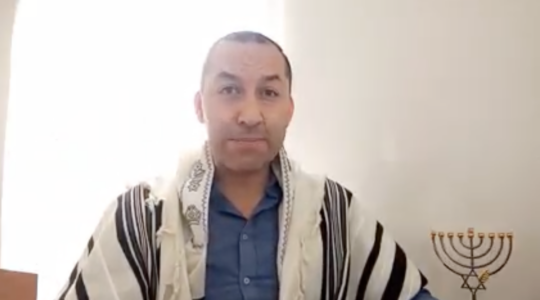(JTA) – A judge in Belarus cleared the way for the construction of apartments atop two former Jewish cemeteries.
Separately, unidentified individuals smashed 24 headstones in a Jewish cemetery in Ukraine.
Eduard Dolinsky, the director of the Ukrainian Jewish Committee, in a statement wrote that the incident in Ukraine was discovered Tuesday at the Jewish cemetery of Svaliava in the country’s west. The incident was reported to police, who currently have no suspects.
Earlier this month, a mass grave was discovered during construction near the Ukrainian city of Ivano-Frankivsk. Locals initially ignored the find because they assumed the bones belonged to Jews buried in a nearby cemetery, Radio Svoboda reported, but the works were stopped because the bones were thought to be of non-Jews purged by communist authorities.
On Monday, the Tsentralny District Court in Belarus allowed the planned construction of the apartments on the former Jewish cemetery in the eastern city of Gomel, saying it lacks the jurisdiction to take any action, Radio Svoboda reported.
The judge was ruling on a motion seeking an injunction against the construction filed by Yakov Goodman, a Jewish-American activist for the preservation of Jewish heritage sites in his native Belarus. Local authorities last year approved a project for the construction of two luxury apartment buildings on the grounds of a former cemetery on Sozhskaya Street.
The motion also pertained to earthworks already underway in the city of Mozyr at another former Jewish cemetery, as per permits issued in 2015, according to the World Association of Belarusian Jews, which Goodman heads.
Both projects mean that bones of Jews buried in the two cemeteries “will end up in city dumpsters,” Goodman told JTA earlier this week.
Belarusian officials have vowed to protect Jewish heritage sites in Belarus, including cemeteries.
Last year, Belarusian Foreign Minister Vladimir Makai and Lesley Weiss, chair of the U.S. Commission for the Preservation of America’s Heritage Abroad, signed a joint declaration at the World Jewish Congress headquarters stating “Each party will take appropriate steps to protect and preserve properties that represent the cultural heritage of all national, religious, or ethnic groups that reside or resided in its territory.”
Goodman said the signing only encouraged authorities “to further attacks on Jewish heritage sites.”
Before the document was signed, Goodman’s association accused Belarusian authorities under the country’s authoritarian president, Alexander Lukashenko, of destroying three synagogues – one in Luban and two others in the capital, Minsk – and at least two Jewish cemeteries in addition to Gomel and Mozyr.
Local activists are “afraid, understandably” to put up a fight in local courts, said Goodman, who was arrested and detained briefly in 2004 in Belarus for his activism.
“Under Lukashenko, Jewish heritage suffered irreparable losses,” said Goodman, who added he may appeal the ruling Monday.
In replying to the motion on construction in Gomel, the city’s urban housing and communal services department told the court, “There is no information about the location of the cemetery in this place.”
But this assertion was disputed by several historians, including Evgeny Malikov, who wrote earlier this year in a report that the planned construction is “strictly prohibited” also by Belarusian laws. Both he and Goodman accused authorities of discriminating against Jewish buildings while showing more sensitivity to Christian ones.
JTA has documented Jewish history in real-time for over a century. Keep our journalism strong by joining us in supporting independent, award-winning reporting.





